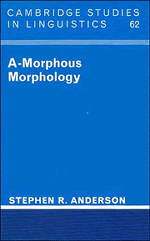Book contents
- Frontmatter
- Contents
- Acknowledgments
- Introduction
- 1 The study of word structure
- 2 Why have a morphology at all?
- 3 Is morphology really about morphemes?
- 4 The interaction of morphology and syntax
- 5 The theory of inflection
- 6 Some complex inflectional systems
- 7 Morphology in the lexicon: derivation
- 8 Clitics are phrasal affixes
- 9 The relation of morphology to phonology
- 10 How much structure do words have?
- 11 Composites: words with internal structure
- 12 Morphology and the typology of languages
- 13 Morphological change
- 14 Morphology as a computational problem
- References
- Index
7 - Morphology in the lexicon: derivation
Published online by Cambridge University Press: 10 January 2011
- Frontmatter
- Contents
- Acknowledgments
- Introduction
- 1 The study of word structure
- 2 Why have a morphology at all?
- 3 Is morphology really about morphemes?
- 4 The interaction of morphology and syntax
- 5 The theory of inflection
- 6 Some complex inflectional systems
- 7 Morphology in the lexicon: derivation
- 8 Clitics are phrasal affixes
- 9 The relation of morphology to phonology
- 10 How much structure do words have?
- 11 Composites: words with internal structure
- 12 Morphology and the typology of languages
- 13 Morphological change
- 14 Morphology as a computational problem
- References
- Index
Summary
The place of the lexicon in relation to other components of a complete morphological description is implicit in much of what has already been said above. In particular, from the discussion of the word- (or stem-) based nature of morphology, and of the interaction of morphology with the syntax, the broad outlines of a possible internal organization for the lexicon are fairly clear. However, it is first necessary to say a few words about the notion of ‘lexicon’ itself. We suggest that this is properly construed as a component of linguistic knowledge (parallel in this respect to syntax and phonology), rather than merely as a list of arbitrary items. We then proceed to consider an important class of rules that characterize much of a speaker's lexical knowledge: the traditional domain of derivational processes. Finally, we discuss the issue of productivity, which bears in important ways on the status of particular lexical rules within the grammars of individual languages.
The lexicon
As Aronoff (1988) points out, there are a number of distinct senses that can be (and have been) assigned to the notions ‘lexicon’ and ‘lexical.’ Two of these are the principal concerns of Aronoff's discussion: the notions of the lexicon on the one hand as the locus of idiosyncrasy in language, and on the other as a collection of all of the items that belong to ‘open’ or ‘major’ word classes (typically Nouns, Verbs, and Adjectives).
- Type
- Chapter
- Information
- A-Morphous Morphology , pp. 180 - 197Publisher: Cambridge University PressPrint publication year: 1992



